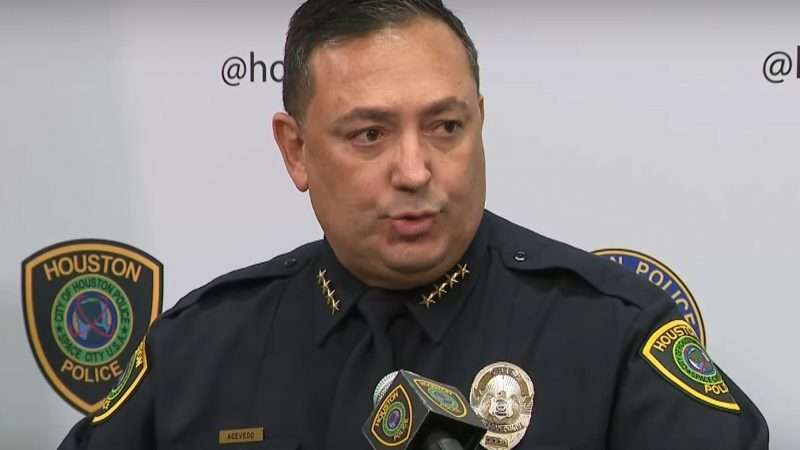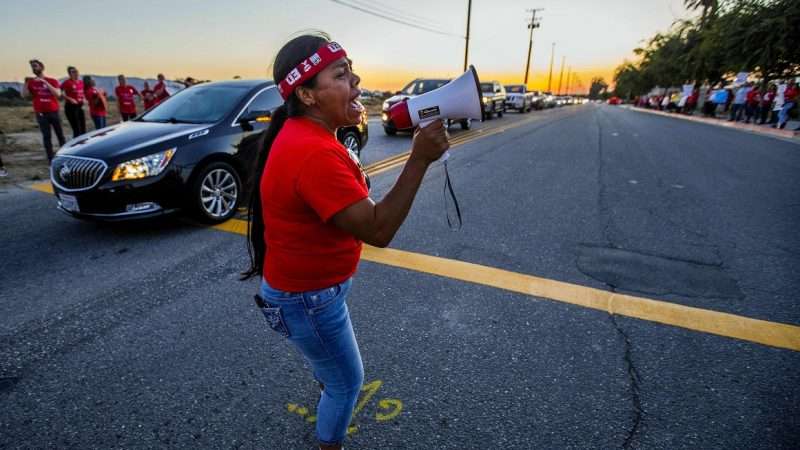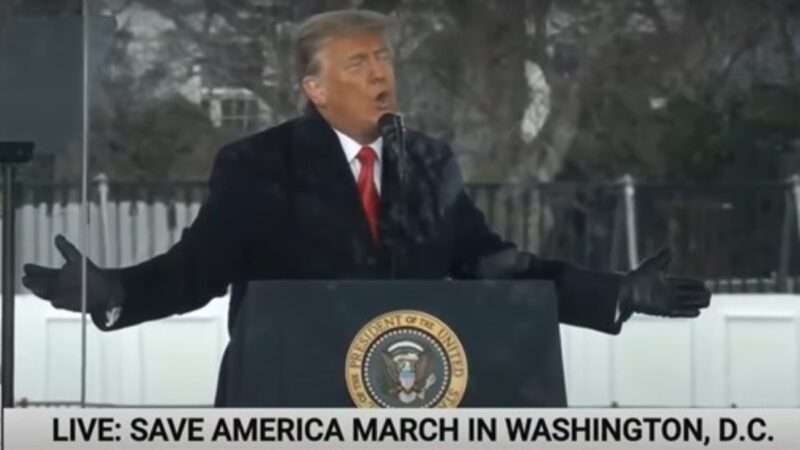
Two years ago today, Houston narcotics officers broke into a house at 7815 Harding Street and killed all three occupants: Dennis Tuttle, a disabled 59-year-old machinist and Navy veteran; his 58-year-old wife, Rhogena Nicholas; and their dog. The couple’s families marked the sad anniversary by filing federal civil rights lawsuits against the city, the police chief, and 13 officers implicated in that deadly home invasion, which was based on a no-knock search warrant that Officer Gerald Goines obtained by falsely portraying Tuttle and Nicholas as dangerous drug dealers.
The centerpiece of Goines’ search warrant affidavit was a fictional heroin purchase by a nonexistent confidential informant. Another narcotics officer, Steven Bryant, backed up Goines’ phony story by claiming he had verified the nature of the “brown powder substance” that supposedly had been bought at the Harding Street house from a “white male, whose name is unknown.” Goines and Bryant eventually were charged with several state and federal crimes, including two counts of felony murder against Goines.
Houston Police Chief Art Acevedo, who hailed the cops who killed Tuttle and Nicholas as “heroes,” would like the story to end there: with two bad apples whose lies led to the regrettable but appropriate use of deadly force against two people who, in turned out, were not actually heroin dealers. But the lawsuits argue that the blame extends to 11 other cops who helped instigate the raid, executed it, or allowed it to happen; Acevedo, who has never apologized for posthumously defaming Tuttle and Nicholas or given a full explanation of why they died; and the city, which built a moldy barrel where apples were bound to go bad and spread their rot.
“Murder, corruption, lies, sex, and perjury—the history of the Houston Police
Department, and in particular, the Houston Police Department’s Narcotics Squad 15, plays out like a scene from Training Day,” says the complaint that Nicholas’ mother and brother filed in the U.S. District Court for the Southern District of Texas. “As approved and encouraged by the leaders of the City of Houston, Squad 15 operated as a criminal organization and tormented Houston residents for years by depriving their rights to privacy, dignity, and safety. This misconduct included (1) a long list of illegal search warrants obtained by perjury, (2) false statements submitted to cover up the fraudulent warrants, (3) a sexual relationship between an informant and police officer, (4) improper payments to informants, (5) illegal and unconstitutional invasions of homes, (6) a long list of illegal arrests and excessive force against Houston citizens, and, ultimately, (7) the murder of Rhogena Nicholas and Dennis Tuttle.”
Goines, the man Acevedo initially described as “a big teddy bear” who was “tough as nails” and had “tremendous courage,” worked in the HPD’s Narcotics Division for 25 years. During that time, according to news reports, court documents, and charges filed by Harris County prosecutors, Goines routinely lied to obtain no-knock search warrants, framed innocent people, handled evidence recklessly, carried on a sexual relationship with a confidential informant, and bilked taxpayers by claiming phony overtime.
This was the guy Acevedo held up as a model police officer, and he did not operate in a vacuum. He was aided and abetted by dishonest or apathetic colleagues, negligent supervisors, and lax judges.
In 64 of 66 cases where Goines applied for search warrants from January 2012 to January 2019, he asked for permission to dispense with the knock-and-announce rule. In 61 of those 64 cases, he claimed the suspect had a gun, which he said presented a threat that justified a no-knock warrant. “Yet even though Goines made arrests in approximately 91.8% of cases,” the Nicholas complaint notes, “he never recovered a single firearm in the subsequent return and inventory list after the search.” Something similar happened in the Harding Street case: Goines claimed his imaginary confidential informant had seen a 9mm “semi-auto hand gun” in the house, but police found no such weapon.
The Tuttle family’s complaint describes five cases in recent years where Goines or Hodgie Armstrong, another narcotics officer, lied about a drug buy to justify a search warrant, as Goines did to frame Tuttle and Nicholas. In one of those cases, Goines obtained a no-knock warrant by falsely claiming that the suspect had a “semi-automatic handgun of a .40 caliber.” When Goines’ colleagues in Squad 15 executed the warrant, they killed a dog but spared the occupant, who received an eight-month jail sentence because he had less than a gram of cocaine.
The Tuttle lawsuit also notes the case of Otis Mallet, whom Goines arrested on trumped-up crack cocaine charges in 2008. Mallett was sentenced to eight years in prison and served two before he was released on parole. After the Harding Street raid led prosecutors to re-examine Goines’ cases, Mallett was declared “actually innocent.” So far, the Tuttle complaint notes, prosecutors have “dismissed nearly 200 cases based on the fact that Goines, now shown to be corrupt, was involved.”
Goines was by no means the only corrupt officer in Squad 15. Since the Harding Street raid, Harris County District Attorney Kim Ogg has charged a dozen current or former narcotics officers with felonies, including lies about overtime and drug purchases.
“Houston Police narcotics officers falsified documentation about drug payments to confidential informants with the support of supervisors,” Ogg said in July. “Goines and others could never have preyed on our community the way they did without the participation of their supervisors; every check and balance in place to stop this type of behavior was circumvented.”
After Ogg announced those charges, which included theft and tampering with government documents, Acevedo released the results of an internal audit that revealed widespread sloppiness, if not outright malfeasance, in the Narcotics Division. And after Ogg announced new charges against nine narcotics officers on Monday, alleging that they had engaged in “organized criminal activity” by falsifying government records as part of “a long-term scheme to steal overtime from the city,” Acevedo said he would look into it.
This was the culture of corruption and impunity in which the Harding Street case unfolded. The case began with a false tip from a neighbor named Patricia Garcia. “For petty and vindictive personal reasons,” the Tuttle complaint says, “she falsely claimed that her daughter was inside the house at 7815 Harding Street, that the house was a drug house, that the female resident was a heroin dealer, and that the residents had guns, including machine guns, inside the house.”
Acevedo would later credulously cite Garcia’s allegations as evidence that Tuttle and Nicholas maintained a locally notorious “drug house.” Even after Goines’ lies were revealed, Acevedo bizarrely insisted that police “had probable cause to be there.” Yet as the FBI discovered, Garcia made the whole thing up. When a federal grand jury indicted Goines and Bryant in November 2019, it also charged Garcia with “convey[ing] false information by making several fake 911 calls.”
The Tuttle lawsuit notes that the patrol officers who responded to Garcia’s call found no evidence to back up her claims. One of them, Nicole Blankenship-Reeves, nevertheless passed handwritten notes about the Harding Street house to Lt. Marsha Todd, “with whom she had a relationship.” Todd, who was in charge of Narcotics Squad 24 and is one of the defendants named in both lawsuits, shared that information with Goines.
Goines claimed he conducted a two-week investigation based on that tip. But he seems to have applied for the search warrant without knowing anything about Tuttle and Nicholas, neither of whom had any criminal convictions. The Tuttle complaint notes that they had lived on Harding Street “for many years” and were “well known and liked by their neighbors” (except for Garcia, presumably). But as Goines’ affidavit shows, he did not even know their names. Unfazed by that red flag, Houston Municipal Court Judge Gordon G. Marcum approved the no-knock warrant a few hours before the raid.
Acevedo argues that Goines’ colleagues in Squad 15 acted in good faith based on a warrant they believed was valid and should not be held responsible for his fabrications. On Monday, after Ogg charged Officer Felipe Gallegos with murdering Tuttle, Acevedo said “the other officers involved in the incident, including the officer indicted today, had no involvement in obtaining the warrant and responded appropriately to the deadly threat posed to them during its service.”
The Tuttle and Nicholas families strongly disagree, saying the cops recklessly used deadly force in a situation that did not warrant it. Acevedo said the first officer through the door “was charged immediately by a very large pit bull,” which he blasted with a shotgun. But a forensic examination of the house commissioned by the families found that the dog was about 20 feet from the front door when it was shot. “The dog was not attacking Squad 15,” the Nicholas complaint says. “Because HPD broke into her house, fired their weapons first, and killed her dog, Nicholas—unarmed and located on the west [side] of the room—began screaming. HPD then filled the room with gunshots.”
According to Acevedo, the cops did that because Tuttle responded to the violent invasion of his home by grabbing a .357 Magnum revolver and firing at the intruders. This week Gallegos’ lawyer said Tuttle fired a total of four rounds, and every one of them hit his targets, striking one officer in the shoulder, two in the face, and one in the neck.
Tuttle’s relatives consider that feat implausible. “Dennis was 5 feet 7 inches tall,” their complaint notes. “He weighed 112 pounds. He suffered permanent disabilities. He suffered from other acute physical ailments which would have impacted his ability to do what HPD claims: he was wearing a brace on his left knee and had an ace bandage wrapped around his right wrist, and he was right-handed. He was not wearing body armor of any kind.”
Tuttle’s family notes that the city has refused to produce medical or ballistic evidence to support the police version of events, and they raise the possibility that the injured officers were hit by “friendly fire.” Assuming that Tuttle did fire at the officers, the complaint says, “he did so lawfully in defense of himself, his wife, and his property, in circumstances under which any reasonable person would conclude that his home was under attack by violent criminals.”
Acevedo claims the cops shot Nicholas because she posed an imminent threat. After the first cop through the door was shot, Acevedo said at a press conference the day after the raid, he “fell on the sofa in the living room,” at which point Nicholas “reached over the officer and started making a move for his shotgun.” Responding to that threat, he said, “other officers in the stack that made entry discharged their firearms, striking that female suspect.”
The independent forensic examination, which was overseen by Michael S. Maloney, a former supervisory special agent with the Naval Criminal Investigative Service, contradicted that account. Maloney concluded that Nicholas “was fatally struck by a bullet from a weapon fired outside the Harding Street Home by a person shooting from a position where the shooter could not have seen Ms. Nicholas at the time she was fatally shot.”
Maloney found that police had fired several rounds through the exterior wall of the house near the front door. Nicholas was hit three times. “At least nine shots hit Dennis,” the Tuttle complaint says, “and dozens of other rounds were fired.” They hit the ceiling, the walls, the stove, and the kitchen cabinets. Contrary to what Acevedo says, that does not look like evidence that the cops “responded appropriately” to a “deadly threat.” It looks like evidence that they fired blindly and wildly.
The lawsuits argue that the officers who participated in the raid are liable for violating the Fourth Amendment by using excessive force or by failing to prevent their colleagues from doing so. The families say the city is liable for encouraging Fourth Amendment violations through “policies, customs or practices” that tolerated them.
According to the Tuttle complaint, the city’s failures included inadequate training, lax supervision of confidential-informant use and tactical plans, and allowing no-knock raids without body cameras, “without the presence of the case agent’s supervisor,” and without “supervisory review of the investigative efforts which support the search warrant affidavit.” Such practices “allowed, encouraged, and assisted Squad 15 to engage in its improper searches and use [of] excessive and deadly force.” For years before the Harding Street raid, the Nicholas lawsuit says, city policy makers “created the precise custom and practice that killed Nicholas by approving, encouraging, ratifying, defending, or covering up the long history of unconstitutional conduct.”
A few weeks after his officers killed Tuttle and Nicholas, Acevedo promised he would “leave no stone unturned to determine the good, the bad and the ugly.” But two years later, despite his promises of transparency and accountability, he and other city officials have yet to answer basic questions about the raid, including what basis (if any) there was to think Tuttle and Nicholas were drug dealers, how many rounds were fired during the raid, who shot whom, and how police know that. Because of that stonewalling, Nicholas family lawyer Michael Doyle said at a press conference today, “the only way we’re going to get to the bottom—or the top—of what really is going on…is by filing a civil action.”
John Nicholas, Rhogena’s brother, said their 87-year-old mother, Jo Ann Nicholas, “is not going to quit. She asks me every day….She says, ‘It’s been two years now. Are they ever going to tell us what happened?'” Although “it’s taken a real toll on her,” he said, “she’s not backing down….We’re not going to quit until we get answers.”
from Latest – Reason.com https://ift.tt/36m4Gcm
via IFTTT

